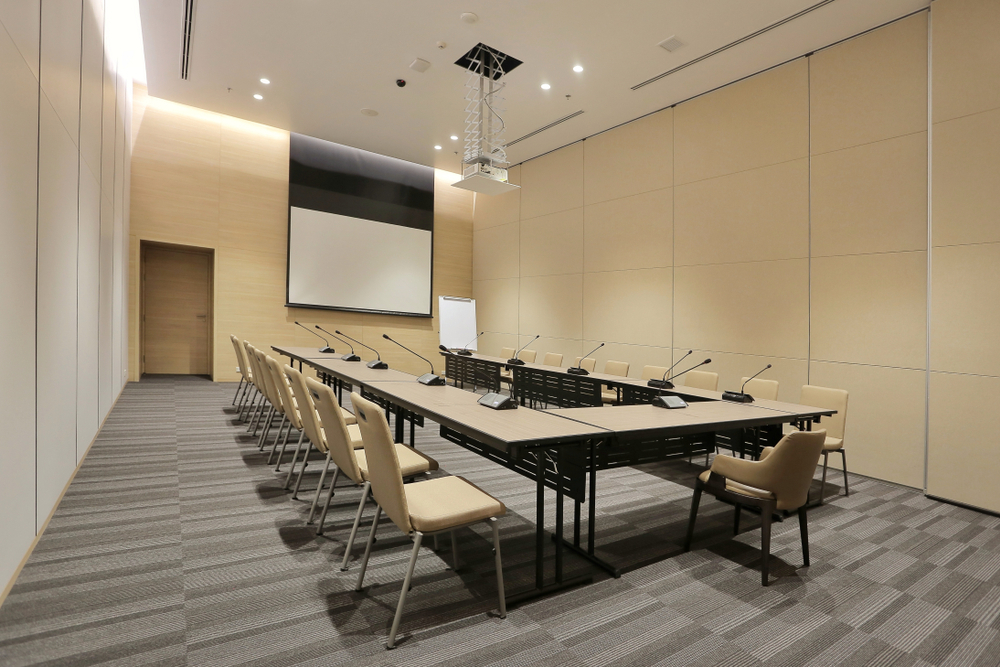When you’re planning corporate meetings, one of the first things you need to decide is the venue. This key decision will influence accommodations, marketing, and a host of other factors. With this in mind, how can you ensure that the meeting venue you choose works for your event?
The first step is to figure out your priorities. What kind of experience do you want guests to have? What is the purpose of the meeting? For example, is this event primarily for networking, training, or celebrating? Once you’ve established your highest priorities, it’s time to look at the many factors that can impact your event.
1. Environment
Your chosen venue has a significant impact on the overall environment of your meeting, which in turn influences guests’ impressions of your company and the event itself. As such, you should figure out what kind of atmosphere you want before looking at locations:
- Do you want a large and spacious area or a small and intimate space?
- Do you want to create a professional, business-like atmosphere or a more relaxed, casual feeling?
- Is it important that guests are able to move about the event easily, or is there a strict itinerary that requires attendees to follow directions?
2. Signage and Branding
When we talk about branding, we’re not just referring to your company — the meeting should have its own branding that lets attendees know exactly what to expect. There are certain parts of branding, such as releasing an app that requires little input from a venue, but others may run into trouble if the location in question has signage restrictions.
Before you commit to a location, make sure you know the rules about hanging banners and putting up signs. Some places are very strict about what materials you can use and how you can display them.
3. Staffing
Does the venue have a staff, or will you need to provide your own? Oftentimes, locations have some staff with limited roles, such as technicians who can assist with presentations or janitors who can clean up areas after the event has closed for the night.
Most places have a liaison who coordinates between your meeting planners and venue staff to ensure everyone is on the same page. If the location you’re looking at doesn’t have a liaison, know that you’ll have to take on more organizing responsibility.
4. Restrictions
One of the most important things to know about a venue is restrictions, as they may interfere with your plans. Make sure to go over all the restrictions with your liaison and lay out the penalties for any infractions. For example, many places have rules about what kind of vehicles can be used inside buildings to prevent damaging the carpet. If any flooring is damaged as a result of breaking these rules, the entity using the space is usually responsible for the cost of fixing it.
5. Technology
What kind of technology is available for your event? Nowadays, events usually require technology to some degree:
- Projectors for watching films or clips
- Microphones and speakers for speeches
- Lighting for parties or presentations
The venue may have equipment you can use in some cases, while other places offer hookups and expect you to provide any necessary audiovisual equipment. Since many meetings include guest speakers, music, and visual aids, it’s crucial that you know exactly what technology is available before you sign a contract.
6. Food
Food and beverages are another area where venues tend to vary widely on what they provide. For example, some places have their own kitchens and staff and are more than happy to cater an event for an additional fee. Some places can provide food but require that you provide serving staff. Still, others don’t offer any kind of catering, but partner with vendors you can contract.
You should also clarify rules about guests bringing food into the venue. Many people prefer to bring things from home to cut down on costs, but there may be areas in which food is prohibited.
7. Amenities and Services
Amenities and services are a great way to draw in a larger crowd, but you have to be careful about what you offer. Some venues are willing to provide certain services for a fee, while others offer outside vendors you can partner with. Some places have limited amenities that are part of your rental package. Here are a few popular services you should consider while looking for a location:
- Sightseeing tours
- Transportation
- Ticketing
- Staging
- Floral arrangements
8. Accessibility
Is the location easily accessible for guests? Are the buildings in compliance with ADA regulations? Is the surrounding area difficult to navigate if you’re not familiar with the location? Accessibility is one of the first things attendees notice, and a negative impression can color the rest of their experiences.
9. Parking
If most of your guests are bringing their own vehicles, parking is a major concern. For one, there needs to be enough space for all guests. Second, parking should be relatively close to the venue. If this isn’t feasible, you should consider providing shuttles or other transportation to pick up guests from distant lots.
There’s also the question of cost. Is the parking free for public use, or do drivers have to pay? Can guests get their tickets validated? These questions need to be answered in the beginning stages of planning.
10. Layout and Space
The functionality of a space is the most important thing when choosing a meeting location. Is the venue’s layout conducive to your plans? Does it offer rooms with movable or removable walls that can be altered as your itinerary dictates? Even if a place fulfills all your other needs, you should look elsewhere if it can’t provide the space you require in terms of size and layout.
11. Pricing Packages
Many venues offer pricing packages that include certain perks or services. This makes it easier to compare prices and ensure you’re getting the best deal. It’s advisable to compare many locations to get an idea of the going rate for venues while you create your budget. This allows you to create a priority list that fits within your budget.
12. Lodging Accommodations
Finally, if your meeting is going to last multiple days, you’ll need to consider guest lodging. Many venues offer on-site accommodations or are directly connected to nearby hotels. If neither of these is an option, you’ll need to ensure that there is adequate lodging close by and provide transportation from hotels to the venue. This information should be decided early in the planning stages to allow guests to make reservations.
Are you looking for the perfect place to host your corporate meeting? Ellicott Development owns and manages a variety of hotels and other venues that are perfect for large-scale events such as retreats, conventions, and seminars. Our staff is happy to help you put on a great event. For more information or to check out available locations, give us a call at 716-854-0060 or contact us online.
Featured Image: Nutcd32 / Shutterstock




